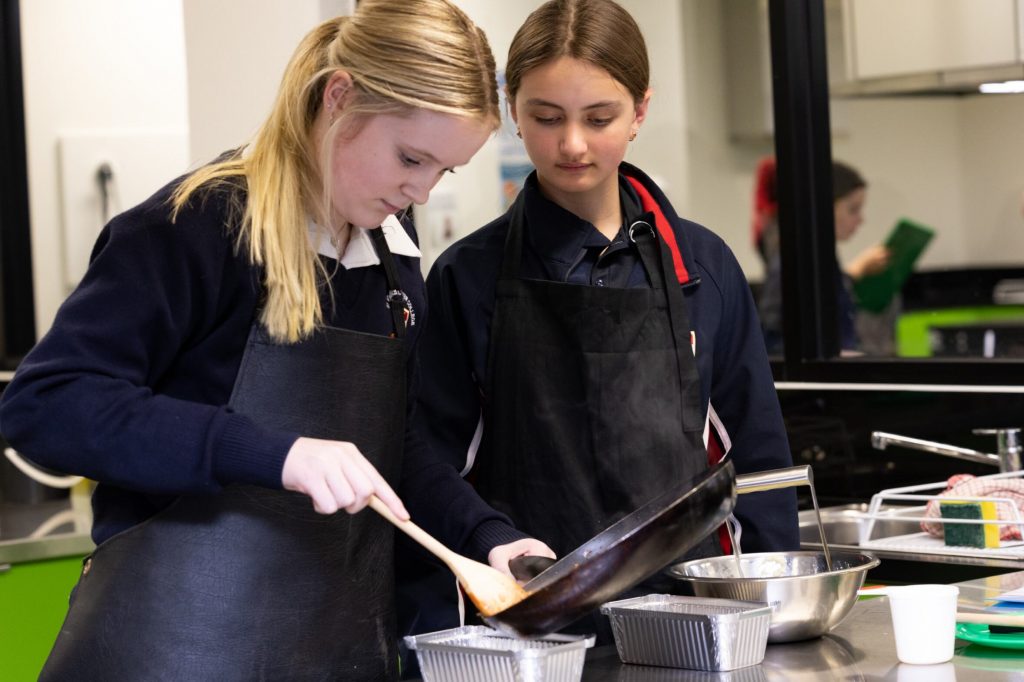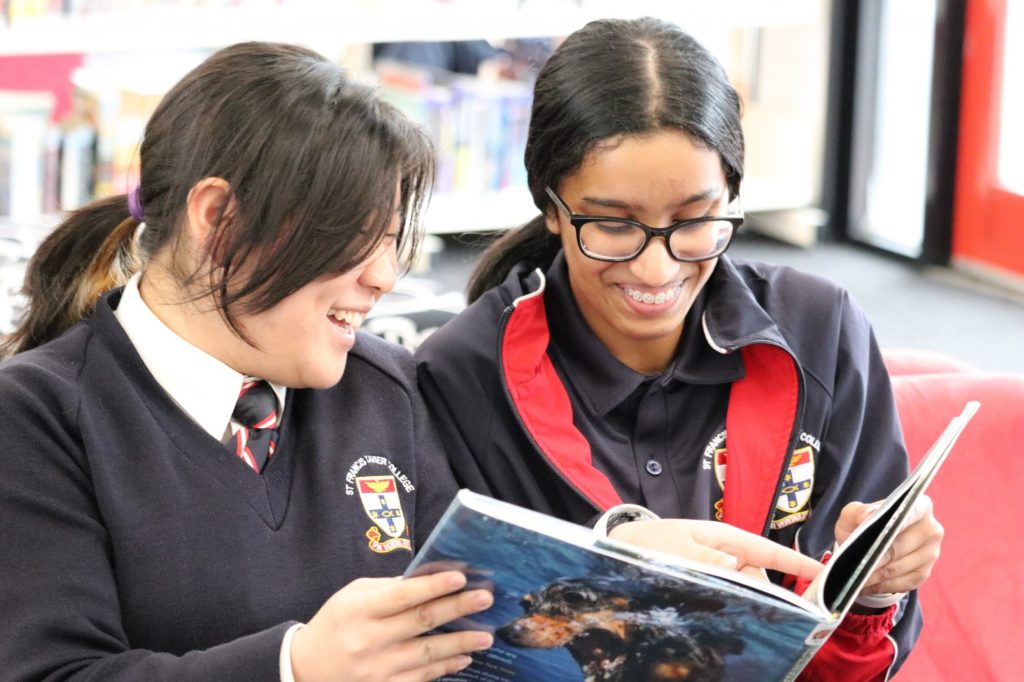Understanding VCE, Vocational Major, and other School Pathways
Wednesday 24th August 2022
For students in their final years of secondary school, it felt for a long time like there were only two options: a pathway to tertiary study through VCE, or a pathway to employment through VCAL. Students now have more options to personalise the final stage of their schooling, particularly in recent ways. It’s no longer just VCAL and VCE.
We are committed at St Francis Xavier College to making the final years of school as helpful, relevant and enjoyable for every student as possible.
What is Senior Secondary Education?
Senior secondary education refers to the final two years of secondary school, where students learn in the greatest depth and begin actively preparing for future study and employment. At this level, students also have the greatest choice in the subjects they do and the approach they take, able to choose from a variety of pathways, including VCE, VCE Vocational Major, and VET.
Students who successfully complete Year 12 earn a Senior Secondary Certificate of Education. While each state and territory has a different name for the certificate, they all indicate the same level of education. In Victoria, this is the Victorian Certificate of Education.
Secondary school pathways options
The Victorian Education System underwent a variety of changes that commenced at the start of 2023, including changes to VCE study and the pathways students can undertake. All of these changes are in service of the education system’s major goal: introducing a fully integrated Senior Secondary Certificate of Education in 2025, which will see all students able to complete their studies under one certificate.
End of school can be a complicated and difficult period for students, even those who are sure of where they want to go. All of education’s aim is to makeq this process as easy and supportive of students as possible. With these system changes, students are able to build a program relevant to their specific strengths, interests and future aspirations. These are the main pathways they can follow.
VCE
The Victorian Certificate of Education (VCE) is the state’s primary secondary education certificate and provides a pathway to tertiary study and employment. Most school learners end up becoming a VCE student, with this the most popular of the end-of-school programs. To be awarded the VCE, students must satisfactorily complete at least 16 units of study over two years. Those 16 units (each comprising a semester of study) must include at least 3 units of a VCE English subject and at least 8 units at Unit 3&4 level (Year 12).
At St Francis Xavier College, students complete 12 units (6 VCE subjects) at the Unit 1&2 level (Year 11), and 10 units (5 VCE subjects) at the Unit 3&4 level. With over 40 VCE subjects offered at the College, students have a great range of study options available.
There are a number of VCE assessment tasks that VCE students must complete over the course of the year, including VCE SACs (school assessed coursework) and SATs (school assessed tasks), VCE exams, and the General Achievement Test (GAT). Students finish their certificate with a VCE ATAR (Australian Tertiary Admissions Rank), which is the primary score that students use to get into undergraduate courses at university.
Unscored VCE
Students can opt to complete an Unscored VCE, in which they will not complete final examinations but may choose to undergo an optional work placement during the exam period. Students still study VCE units of their choice, but can pursue this option if they know they won’t require an ATAR for their pathway. Students are still recognised for completing the VCE, with the unscored option giving them flexibility to remain in school without extra pressure they don’t need.
VCE Vocational Major (VM)
The Vocational Major is a two-year applied learning program that offers students flexibility to complete their education in a more practical and skills-based manner. Similar to the VCAL (Victorian Certificate of Applied Learning) program it replaced in 2023, VCE VM prepares students to transition into apprenticeships, traineeships, university (via non-ATAR pathways) or into the workforce. However, unlike its predecessor, the VM pathway will be situated underneath the overall VCE program, allowing Victoria’s education system to move towards the integrated Senior Secondary Certificate.
VCE VM studies do not receive a study score, but students who complete the requirements will receive a Statement of Results and a Victorian Certificate of Education with the appellation of ‘Vocational Major’.
The VM pathway is a structured pathway designed to help students develop work and employability skills. Students will study four core VM subjects: literacy; numeracy; personal development skills; and work-related skills. Students will also complete a VET subject of their choice and a weekly work placement.
Victorian Pathways Certificate (VPC)
The VPC is designed to accommodate students who aren’t able to complete the VCE, including the Vocational Major, due to additional external needs, previous disruptions to education or significant missed school time. VPC subjects are designed to help students make a transition into the Vocational Major, entry level TAFE or the workplace.
Students are not able to actively choose the VPC, but may be able to opt into it on a needs basis. Discussions about VPC’s suitability for a student should be conducted between the school’s leadership and the family. The program supports student aspirations while also ensuring that they have a quality education that suits their individual background and needs.
Vocational Education and Training (VET)
VET courses provide practical skills that students can take directly into work or build upon in further higher-level qualifications. For most students, VET subjects are undertaken as part of their VCE program, giving students an early qualification that also contributes credit to their VCE studies. VET subjects VCE students can do are varied, but depend on what each individual school offers. SFXC offers VET subjects in Media, Sport and Recreation, Music and Hospitality.
School Based Apprenticeship (SBA)
School based apprenticeships provide students with a pathway to transition from school to the workplace. An SBA allows a student to commence their apprenticeship while still completing their senior studies. This flexible option works well for students on the VCE VM Pathway.
Higher Education Studies
Students who have previously accelerated and completed a Unit 3/4 sequence in Year 11 and achieved a high study score may consider enrolling in Higher Education studies as a Year 12 subject option. There are many Australian Universities who offer subjects for Year 12 students including Deakin University, Federation University, La Trobe University, RMIT University and the University of Melbourne. The results of these can contribute to the ATAR and provide unit credit when commencing university.
Top tips for final years study
Given how integral the VCE is to the education system, there are so many VCE resources students can make use of to amplify their opportunity and engagement. Our best tips should help families and students make the best decisions for their studies, and give them the best chance to enjoy their time at the end of their school journey.
- Guides: Carefully read through the VCE course guide as well as supporting documents about other programs. While the standard VCE program is still the most popular amongst students, it doesn’t suit everyone — put effort into evaluating which program will truly serve your educational and pathway needs the best.
- Resources: There are many free VCE lectures and VCE workshops that occur throughout the year, including before semesters begin and between terms. These cover almost all available subjects, and are usually taught by experienced teachers and assessment markers, giving you the best insights and tips to maximise study.
- Tuition: If you need additional help in a subject or two, consider working with a VCE tutor for extra discussions and insights. Importantly though, VCE tutors are not a replacement for your in-class learning — they are an extra resource that can be beneficial, but they do not have the experience or quality of your teachers.
- Results: Don’t get too caught up in anticipating VCE final results or choosing subjects that will ‘scale up’. The only way to balance your best academic performance with effective skill development for future pathways is to choose subjects you want to study, and to focus on doing your best, not on anticipating and working yourself up over the final number.
Final moments, done your way
To make the most of your final years and to give your VCE meaning and purpose, choose the program that best suits your needs and your aspirations. We believe that all students have the capability to achieve great things, but every student should also have the opportunity to work towards something they want for themselves.
SFXC is proud to be offering the VCE Vocational Major next year alongside our existing programs. We look forward to supporting all students in their pursuit of excellence and continuing to provide a pathway for every child.

